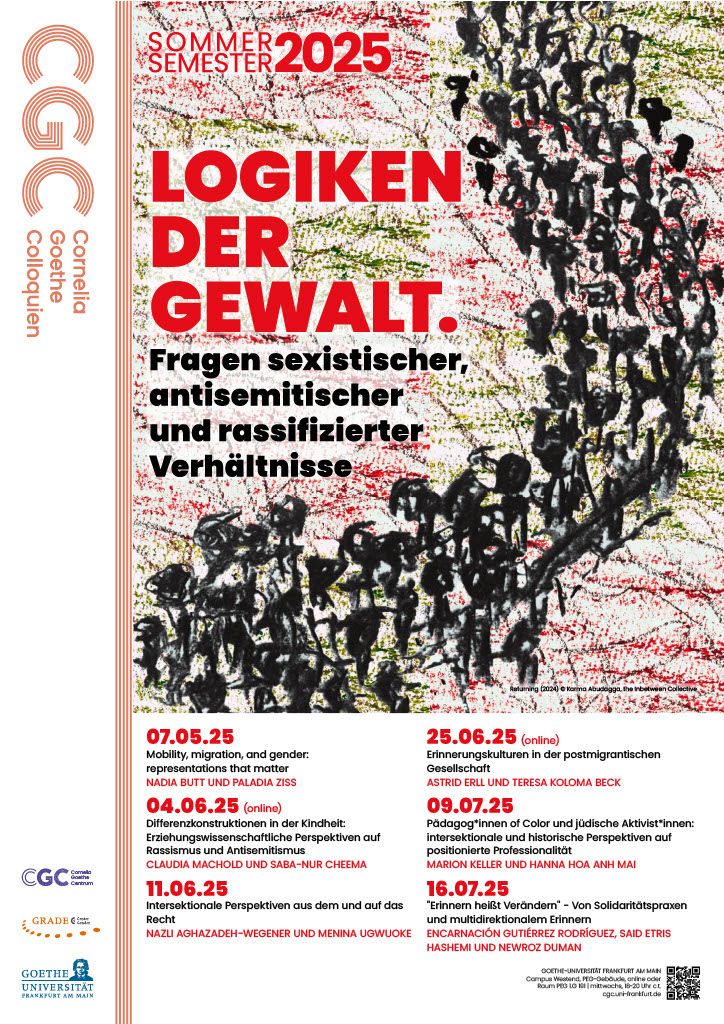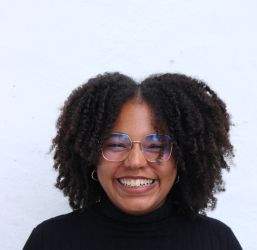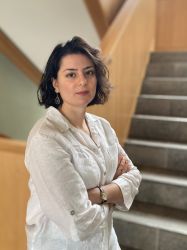
Room 1.G191
The room is accessible via elevators. There are two accessible restrooms on the first floor (1.G40s and 1.G40h).
On the same floor, there is an all-gender restroom (1.G40n) with both urinals and seated toilets. Additionally, there is a FLINTA* restroom (2.G40q) on the second floor, close to the CGC office rooms.
Menina Ugwuoke
Gender and Racism in criminal law
Criminal law is seen by some as an instrument of protection against discrimination, while others see it merely as a reflection of social power relations. Using examples, this lecture deals with the role of gender and racism in criminal law and examines the extent to which criminal law regulations and their application reproduce gender-specific and racist discrimination. The aim is to create an awareness of the ambivalences of criminal law and to develop power-critical perspectives on it.
Nazli Aghazadeh-Wegener
Intersectionality and Social Law
Social security law holds particular significance for women’s experiences of inequality. The social insurance system it regulates is intended to provide support for women in situations where they are unable to sufficiently secure themselves through paid employment. This means they require equal access to essential benefits such as unemployment insurance (Arbeitslosengeld I) and old-age pensions.
However, it is precisely in this context that the entrenchment of intersectional disadvantages becomes evident—along the axes of gender, race, and class. Within the scope of state responsibility, material inequality and certain attributions toward specific groups of women are (re)produced. This applies especially to women who, due to a history of migration, are racialized and socioeconomically disadvantaged.
In my presentation, I aim to shed light on this ambivalent role of social law.

Menina Ugwuoke is a research assistant and doctoral candidate at the junior professorship of Prof. Dr. Leonie Steinl. She completed her law degree at the Humboldt University of Berlin. In 2018, she founded BIJOC* (Black Indigenous Jurastudierende of Color), a networking group for law students affected by racism in Berlin and Brandenburg, and has been a member of Afro-German Women Lawyers since 2023. Her research interests include interdisciplinary legal research, feminist jurisprudence, legal history and criminal law criticism.

azli Aghazadeh-Wegener is a research assistant at the University of Frankfurt a.M. under BVR Prof. Dr. Astrid Wallrabenstein (Chair of Public Law with a focus on social law) and is doing her doctorate on "Intersektionale Diskriminierung im Sozialstaat" (“Intersectional Discrimination in the Welfare State”; supervised by Ute Sacksofsky and funded by the Heinrich Böll Foundation).
The event takes place in German.
The CGC strives to make its events as accessible as possible. If you require assistance in order to participate in our event, please let us know your support needs by 14 May 2025 via email at: cgcentrum@soz.uni-frankfurt.de. We will then do our best to reduce any barriers within the scope of our capabilities. You are also welcome to attend this event with your children. If you would like us to arrange childcare, please contact us at the above email address at least one month before the event. We look forward to your participation.

